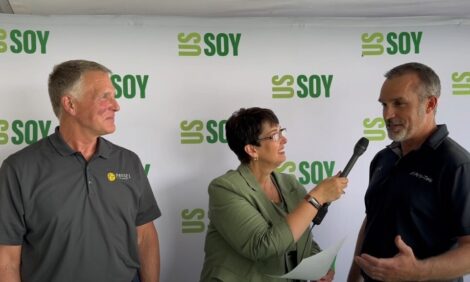



UK/EU Market Update - March 2003.
By the UK's Meat and Livestock Commission - This MLC report looks at the current market situation in the UK and reviews recent price trends and markets throughout Europe.UK/EU Producer Prices

United Kingdom producer prices continued to strengthen in March due to a combination of short supplies and a weaker exchange rate. The average price in the week ended 15 March was 108P/kg dw, 10p more than a month earlier and the highest since October 1997.
Sterling continued to fall against the Euro in January and February, on the back of a falling US dollar and some concerns about the UK economy. By early March the Euro was worth almost 69p, although it fell back slightly during March. Nevertheless in late March it still stood at 67.6p, 3p more than at the end of 2002 and 6p more than in March 2002. This will have made imports less attractive and contributed to the widening differential (especially in sterling terms) between UK prices and overall EU prices.
Acute shortages of weaners, resulting from breeding herd contraction and recent problems with sow infertility, have pushed prices up considerably since the beginning of the year. The average price of 30kg weaners in late March was around £40 a head, £11 more than at the end of 2002. Reduced supplies have also led to much firmer cull sow prices. Cull sow prices will also have shown a particular benefit from the weaker sterling, as around 95 per cent of sow meat production is exported. Prices averaged around 60-62p/kg dw throughout March, compared with less than 40p at the end of 2002.

EU prices, which had strengthened in the first half of February, fell back slightly in the month to mid-March. An increase in supply but no uptake in demand on these markets led to the decline in price. The ending of the Aids to Private Storage Scheme on 19 February is also likely to have been a contributory factor. Prices averaged one per cent lower in the middle of March than a month earlier, although there were some sharp contrasts between individual member states. Spanish prices rose by 4% over this period while there was a particularly sharp decline in German prices, down 8%. Danish prices were little changed although prices in the Netherlands fell back by 3%.
Prices in mid-March were lower than a year earlier in all EU member states with the exception of the United Kingdom. The continued strength of the UK market has led to a further increase in the UK price premium over the overall EU price, to over 20p/kg.
Slaughterings
Weekly GB throughputs reached a low point of 159,000 head in June 2002 but showed some recovery in subsequent months, reaching 185,000 head in November. Average throughput fell back slightly to 174,000 head in December, but this was due to a short Christmas working week. Throughputs continued to fall in January, averaging 157,000 a week. Although this was not unsurprising in the first half of the month, as supplies had been pulled forward for the Christmas market, weekly throughputs remained low in the second half of the month. Throughputs fell further to 152,000 a week in February, while MLC estimates for the first half of March indicate that throughputs remain at about this level. More abattoirs have now moved to only slaughtering on a four-day week owing to lack of supply.

The actual cause of the decline in supplies in recent weeks is unclear. There has been a developing sow infertility problem since last Autumn, although the impact of this on clean pig slaughter levels is unlikely to kick in until April. There may well be no single predominant reason, but a number of factors, including:
- Reports of some sporadic increases in PMWS incidence in the last couple of months.
- Some disruptions to breeding patterns and performance arising from a significant number of producers depopulating and then repopulating last year.
Whatever the precise cause, the impact on apparent sow productivity (measured by pigs finished per sow per year) has been dramatic, as the following graph shows.

Total United Kingdom slaughterings have fallen less markedly than GB slaughterings. This is because of an increase in Northern Ireland, where the breeding herd has been more stable than in Great Britain. Northern Ireland slaughterings have also benefited from an increase in live pig imports from the Irish Republic. Average weekly UK throughput in February is estimated at 179,000 head, 12 per cent lower than a year earlier.
Slaughter levels in February

United Kingdom Census Results
December pig census results for the United Kingdom have now been published. Breeding sow numbers were down five per cent on a year earlier. Gilt replacement numbers were well up. Thus suggests more stability in the breeding herd over the next few months, especially as sow culling rates have fallen back.. However, both in-pig and maiden gilt numbers had been low in December 2001 because of disruptions to replacement policies arising from the ban on exports in that year.

Consumption
Retail pork sales continue to be adversely affected by developing shortages of home-produced product. The volume of purchases in the 12 weeks ended 2 March was down three per cent on a year earlier although, due to slightly higher average prices, expenditure was just one per cent lower. There was a particularly sharp decline in pork purchases over the Christmas period.
Retail bacon sales have been less affected by supply shortages, as there has been an increase in sales of imported bacon. During 2002 some quite marked increases in bacon sales was recorded although in the latest 12-week period there was no further growth in volume purchases or the value of expenditure.
There continues to be growth in overall consumption of processed pig meat products. Sales volumes of frozen pork products fell slightly but there was growth in other product lines. Ham purchases increased by four per cent while pork sausages increased by seven per cent on last year

Source: MLC - March 2003






